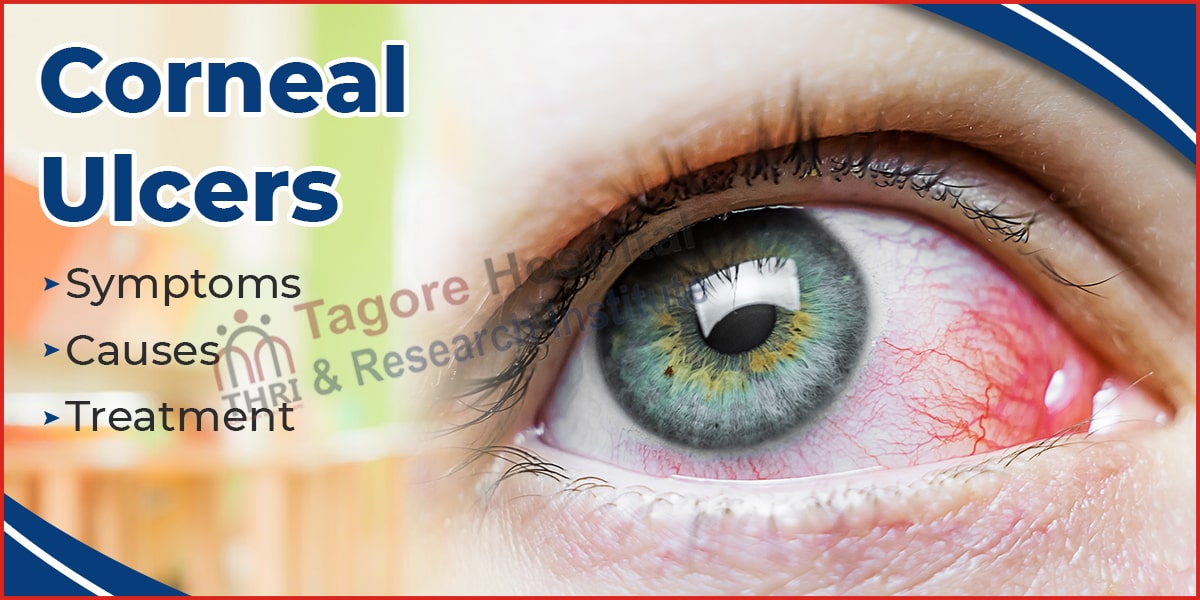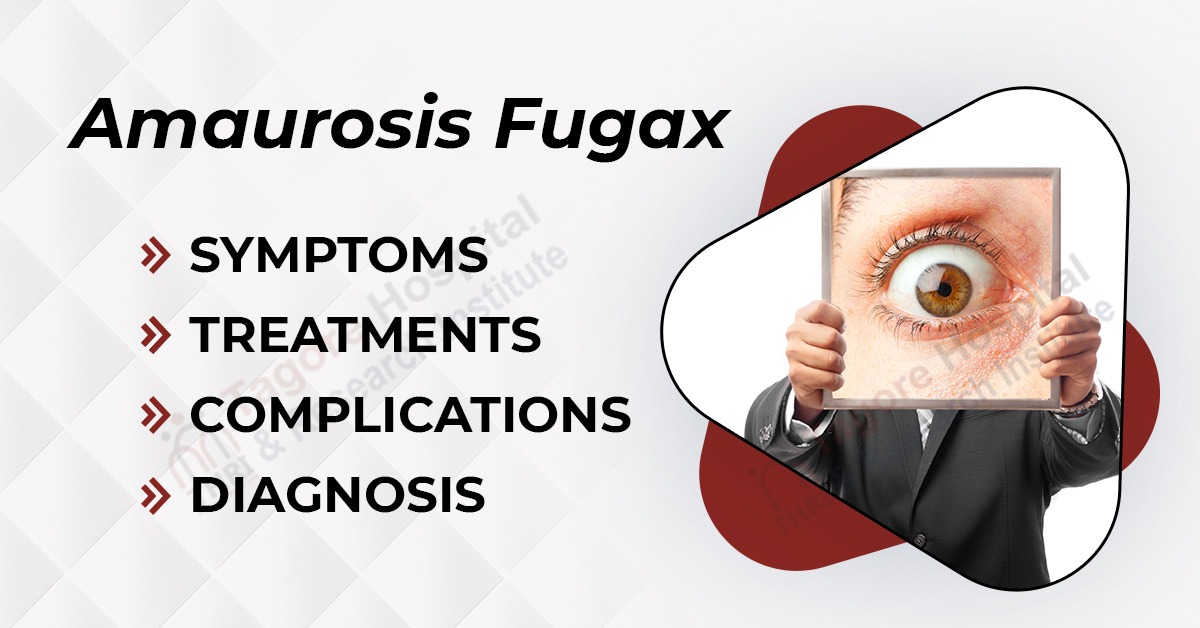- By Tagore
- Posted April 16, 2025
What Is a Corneal Ulcer?
Corneal ulceration is an open sore located on the cornea, which is the clear dome that covers the front of the eye. Corneal ulceration has many causes, the main one being infection, including bacteria, viruses, fungi, or parasites, but also includes certain eye injuries, misuse of contact lenses, or other conditions that involve the eyes.
Clinical symptoms often consist of redness in the eye, pain in the eye, blurring of vision, excessive watering of the eye, sensitivity to bright light, and the feeling of something coming into the eye.
An untreated corneal ulcer may cause some serious complications like the loss of sight or even the eye itself. Diagnosis and treatment early on are fundamental to avoid permanent damage to the eye and include the application of antibiotic, antifungal, or antiviral eye drops.
Common Symptoms of Corneal Ulcers
Common symptoms of corneal ulcers include:
- Eye redness
- Pain in the eye very intense
- Vision is distorted or diminished
- Photophobia
- Watery discharge or tearing
- In the cornea, there is a white or gray spot.
- Swollen eyelids.
- This is the sensation of somatic foreign body (i.e., something inside the eye).
You can read also:- How to Choose the Right Hearing Aid for Your Needs
What Causes Corneal Ulcers?
Corneal ulcers may have a wide range of causes, the most common of which include infections and injuries. The predominant causes comprise:
- Bacterial infections- usually associated with improper use of contact lenses or with an injury to the eye , particularly in those who overdress contact lenses overnight or do not adhere to hygiene.
- Viral infections- Herpes simplex virus is one of the frequent causes of recurrent corneal ulcers.
- Fungal infections- generally come post an injury to the eye involving plant material or in individuals using contaminated eye drops.
- Parasitic infections- Acanthamoeba is a rare but serious parasite associated with poor contact lens hygiene and exposure to contaminated water.
- Eye injury- scratches, burns, or an object in the eye- can cause damage to the cornea and ulceration.
- Dry eye syndrome- extreme dryness may threaten the corneal surface and increase susceptibility to developing ulcers.
- Allergic eye diseases- chronic inflammation may make the eye more susceptible to infections.
- Vitamin A deficiency- rare in developed countries but can lead to corneal damage and ulcers.
Diagnosis of Corneal Ulcers
Diagnosis of corneal ulcers includes both clinical evaluation as well as specialized tests done by an eye care professional. This would usually involve:
- Patient history- The doctor will pose inquiries on the symptoms, utilization of contact lenses, any trauma to the eyes recently, as well as exposure to either chemical or contaminated water, and health conditions.
- Visual examination- The patient is using a slit lamp to examine the eye for damage, ulcers, or other signs of infection.
- Fluorescein staining- A special dye is applied to the eye to show the ulcer and scratches on the cornea under blue light.
- Corneal scraping -A small sample of cells may be collected from the affected area and sent for laboratory analysis to diagnose the type of infection (bacterial, viral, fungal, or parasitic).
- Culture and sensitivity test- These help in knowing the microorganism causing the ulcer and the most effective drugs for treatment.
Best Treatment Options for Corneal Ulcers
The treatments for corneal ulcers are based on the underlying cause, but medications are typically started promptly to control infection, reduce inflammation, and promote healing. Common treatments are:
- Antibiotic eye drops, which may be administered for bacterial infections, sometimes even before laboratory tests are obtained for the specific bacteria.
- If the ulcer is due to a viral infection, like herpes simplex, then antiviral drops are used, whereas antifungal drops are prescribed for fungal infections.
- These are steroid eye drops, which can be used only after the infection is under control since corticosteroids can aggravate certain infections.
- Pain relief may come in the form of lubricating drops or oral analgesics.
- Depending on the severity of the infection, antibiotics or antifungals may be prescribed orally in conjunction with topical drops.
- Contact lenses may exacerbate the ulcer; therefore, all contact lens wear should be immediately suspended until healing is complete.
- In certain scenarios of severe corneal ulceration resulting in scarring or significant corneal damage, intervention via surgery may be required to regain vision.
You can read also:- What are Grass Pollen Allergies: Symptoms, Causes and Treatment?
Prevention of Corneal Ulcers
Proper eye care, protection from dangerous doings, and regulation of underlying eye disorders will go a long way toward preventing the development of corneal ulcers. The preventive tips include the following:
- Practice proper contact lens hygiene – Always wash hands before handling lenses, clean and store them as directed, avoid sleeping in lenses unless approved, and never use tap water to rinse them.
- Protect your eyes – Wear safety goggles or protective eyewear when engaged in activities that pose a hazard of eye injury like sports, construction, or working with chemicals.
- Prevent trauma to the eye – Avoid anything that may scratch or allow a foreign body to enter the eye.
- Treat infections of the eye at the earliest possible time – Seek medical care as soon as any infection of the eye may be suspected to avoid any delays that may worsen the condition.
- Manage chronic eye conditions – Any chronic eye conditions like dry eye, blepharitis, or allergic conjunctivitis should be managed by an eye-care provider.
- Avoid using expired or contaminated eye drops – Always check expiration dates, and do not share eye medicine with others.
- Maintain good nutrition – A well-balanced diet, which includes sufficient vitamin A, is enough to keep the body and eye in good health and protect the cornea.
Conclusion
At Tagore Hospital in Jaipur, we are committed to providing excellent eye care and advanced treatment for conditions such as corneal ulcers. With a large team of expert ophthalmologists and the latest diagnostic and surgical facilities, we ensure the proper management for the preservation of your vision and eye health.
Being one of the best hospital in Jaipur, Tagore Hospital believes in ensuring patients' safety, comfort, and recovery. Do not delay; if you or a loved one are experiencing symptoms of a corneal ulcer, visit us for expert treatment and individualized care. Your vision deserves the best, and this is what we endeavor to offer you day in and day out.
Tags





